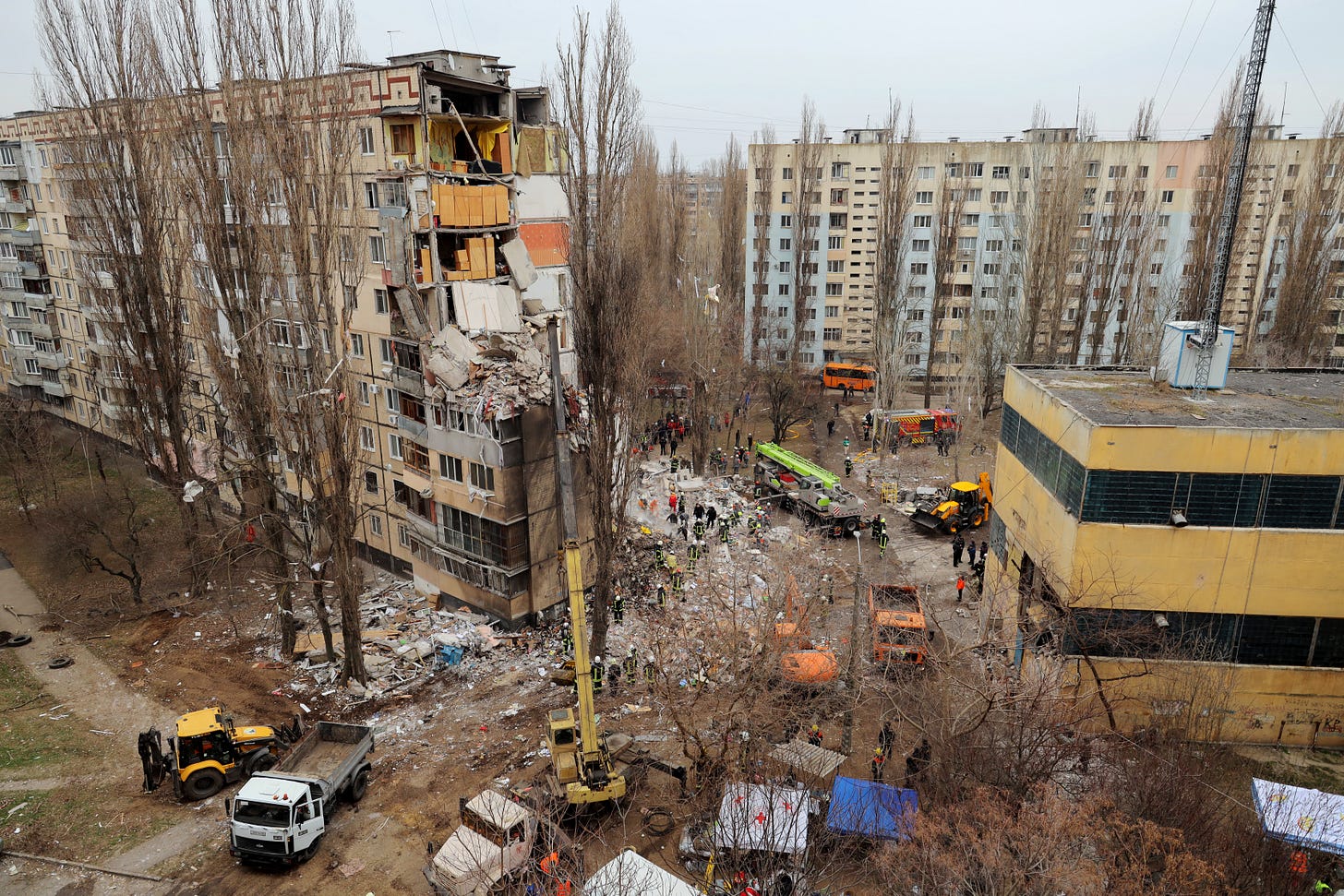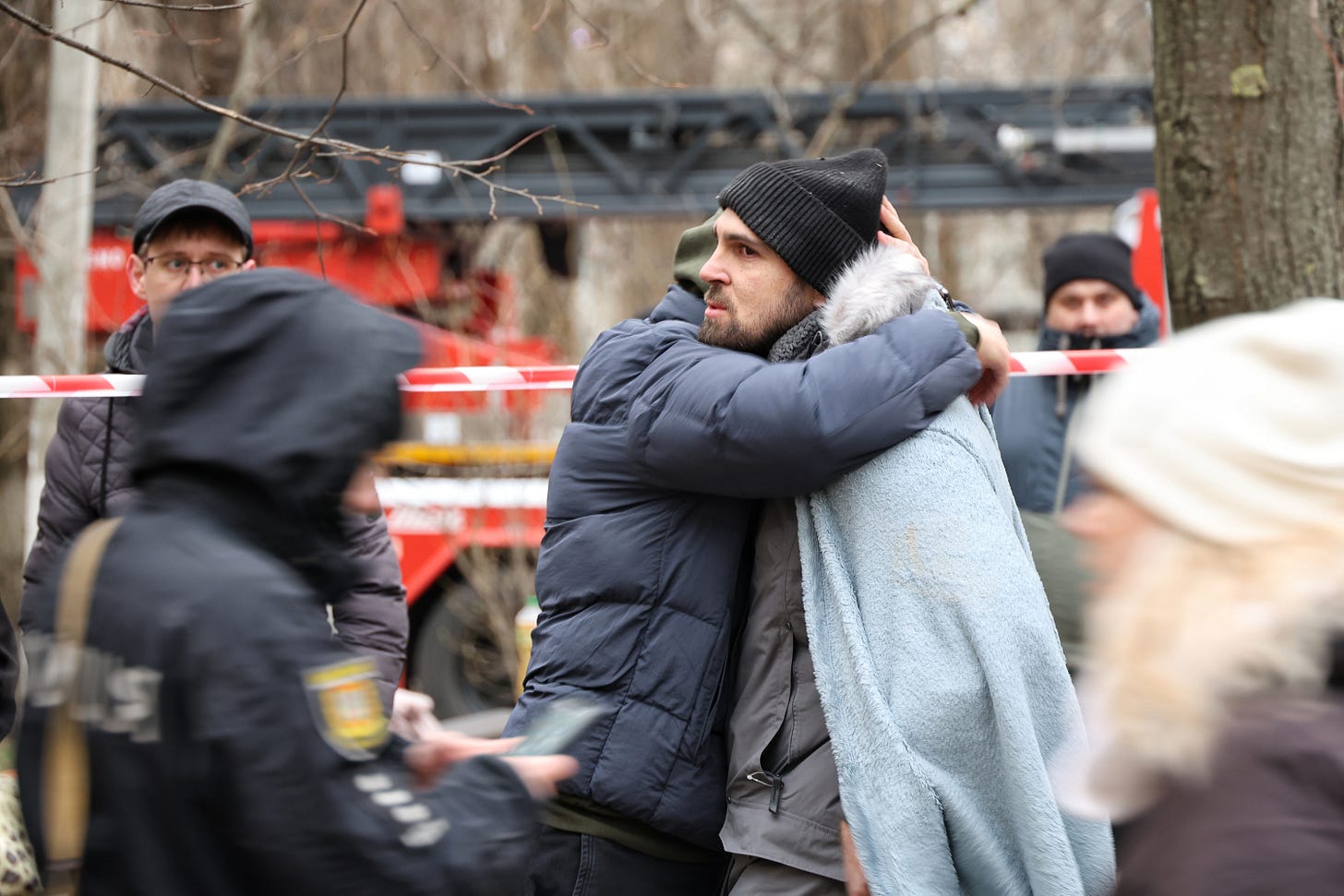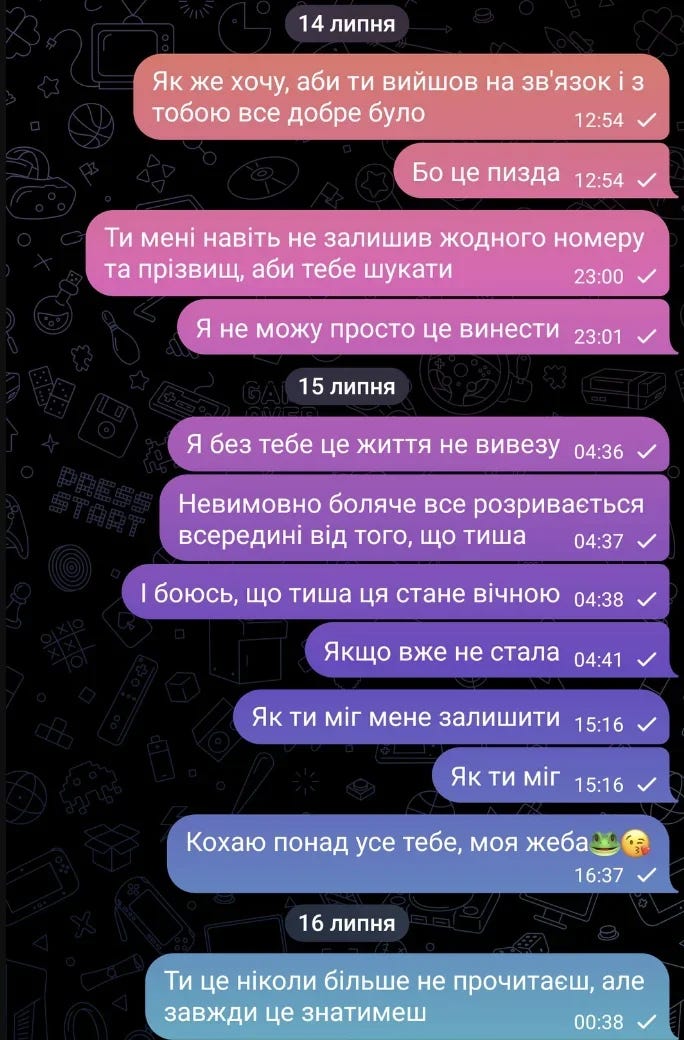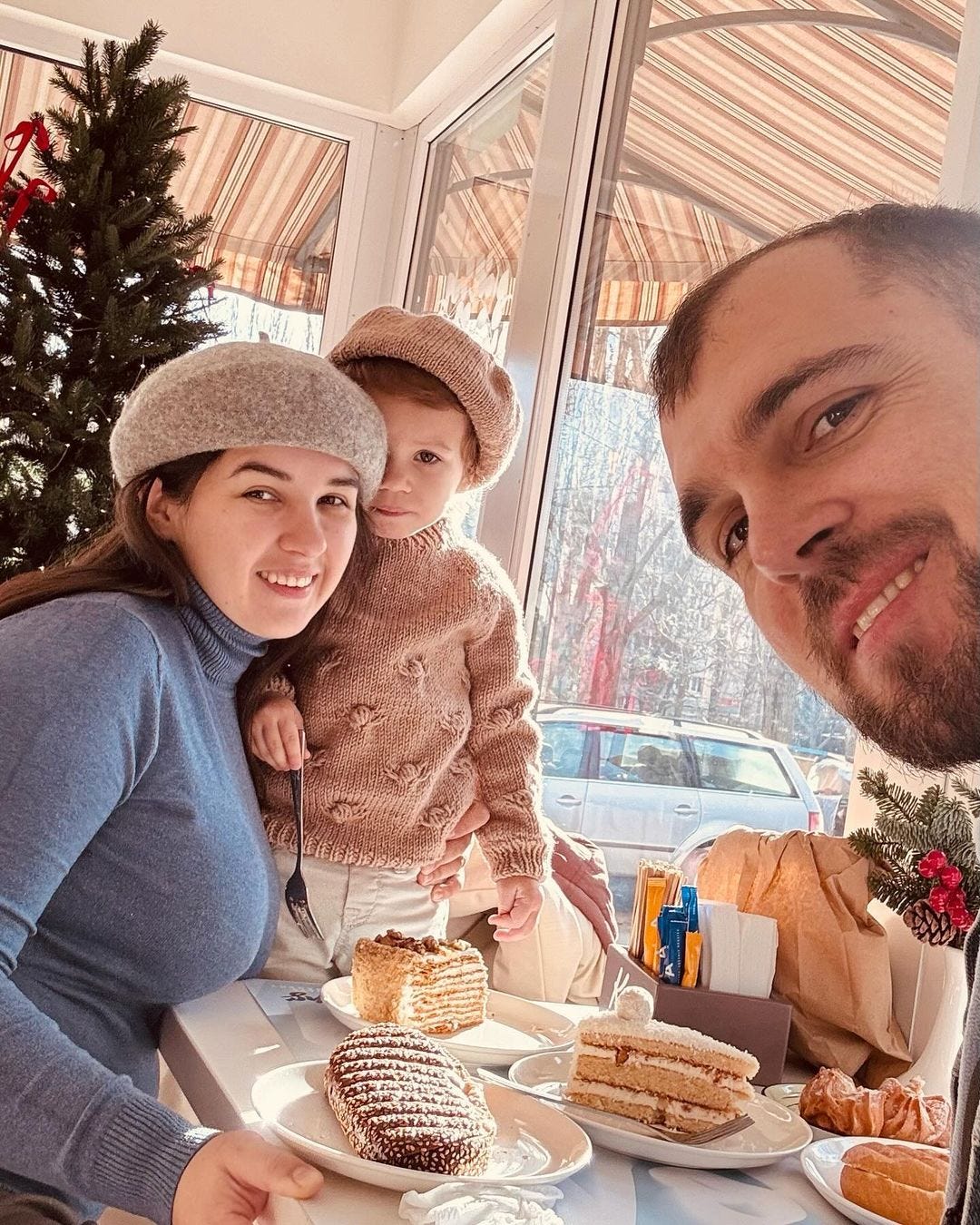Men and Grief.
We explore how Ukrainian men have been processing death through the eyes of Serhii Haidarzhy, who lost his wife and son on the same awful night.
Editor’s Note: Today is Myroslava’s first solo issue, written by her all the way through.
One of our missions is to empower young Ukrainian journalists, and teach them how to engage in compelling feature writing for an English-speaking, Western audience — so that they can tell Ukraine’s stories for a generation to come. Join us in that cause:
"Anya and Tymosha died in their sleep. They didn't feel anything, and didn't even have time to wake up," Serhii said.
Serhii Haidarzhy lost his wife and four-month-old son when a drone struck an apartment building on March 2, 2024. Only Serhii and his daughter survived.
Now they are trying to rebuild their lives.
Just like hundreds of other Ukrainian men who have lost loved ones in the war.
The vast majority of soldiers fighting in Ukraine are male, and as a result, there are many more male casualties than female. Support centers, relatives or friends often help women cope with the loss of their husbands or boyfriends. It is not uncommon for women to write messages to their loved ones on social media — knowing there will never be a response.
But that got us wondering: how have the men who have lost their loved ones been processing their trauma? Are there unique characteristics to how Ukrainian men have been dealing with grief?
Unfortunately, when a man loses his wife or girlfriend in this war, he often withdraws into himself and carries his burden alone.
Serhii and Anya lived in Odesa all their lives. They met just 4 years ago, during a summer church camp.
"It was love at first sight. At the end of the camp, we confessed our feelings and sympathies to each other. And we decided to start a relationship," Serhii said.
They immediately talked about starting a family together. Serhii didn't think twice. He proposed two weeks later. Two months later they were married. A year later, they had a daughter, Lizzie.
"We lived a happy life. We traveled a lot. We watched a lot of sunsets together. We spent a lot of time at the sea," Serhii fondly remembers.
Until the war broke out.
Odesa is located in the south of Ukraine and near the Black Sea — it’s one of the cities the Russians are trying to take. Although it is not a frontline area, it is very easy to shell the city from the sea. There can be three to four air raids per night, and the air defense forces are unfortunately not as strong as in the capital.
One such attack occurred on March 2, 2024 — just over two months ago. It was a Friday night. After a hard week of work, everyone was tired and wanted to rest. Anya is a florist and decorator: at that time she was decorating cafes with flowers, changing the winter decor to spring. She and Serhii got home late.

Serhii went to put his older daughter Lizzie to bed in her own room, while Anya took care of baby Tymofii, whom they affectionately called Tymosha.
"Lizzie drank her milk and fell asleep with a book in her hands, even though she is only 2.5 years old and cannot read," Serhii said with a slight smile.
The man and his daughter fell asleep, and at 1:17 a.m. a tragic explosion occurred.
"We did not hear the [air raid] alarm. But I had a lucid dream, I heard a drone approaching. And then there was an explosion. Our windows blew out. I immediately realized that it was a drone hitting our house," Serhii recalled with horror.
The children's room where he was with Lizzie survived. But the room where Anya was with little Tymosha collapsed, and nothing remained of them.
"I took Lizzie, wrapped her in a blanket and left the room. I wanted to see what was wrong with my wife so that I could take her out as well. But my wife and Tymosha were already gone. They were under the rubble," Serhii said with difficulty, pausing often.
Serhii and Anya usually slept together in their bedroom. Their younger son slept with them in his crib. Anya would put the little boy to bed first and then call her husband. That awful night, she did not call him, so he fell asleep in the nursery with his daughter.
This ultimately ended up saving his life.
"If Anya had called me, Lizzie would probably have been a complete orphan," Serhii said.
From 1:30 a.m. until 7 p.m., Serhii and his eldest daughter tried to find Anya and Tymosha.
"We hoped that they were somewhere under the rubble, in a corner. We believed to our last breath that they might still be alive. But…” Serhii said quietly.

When their bodies were found, an examination showed that Anya and her son had died in their sleep. They did not even have time to wake up.

The March 2, 2024 attack in Odesa, carried out by a Russian drone, killed not only two member’s of Serhii’s family, but a total of 12 people, including five children.
Serhii talks about Anya very carefully. He still speaks about Anya in the present tense, even as he says that he understands that she is gone.
He keeps calling her by affectionate nicknames: Anechka, and Anyuta.
"Anechka is very creative and talented. She is very bright, very playful... and very beautiful. Many people have told us that we look very much alike, like brother and sister," Serhii said tenderly.
During our conversation, I noticed that Serhii still wears a wedding ring. Sometimes he touches it and adjusts it. He says he doesn't want to take it off. It is very precious to him.
With the same affection and tenderness, Serhii also remembers his young son. Tymosha was born in 2023, during the full-scale war. He told us that when they found out his wife was pregnant, he was very happy because children are a great joy.
"He was so small, so dark. Very calm, and patient. He was such a ray of sunshine for all of us in such dark times," Serhii recalls with a smile.

Today, Serhii has only his eldest daughter, Lizzie. She may be the only thing that saves him from what he has been through.
She has not yet fully realized that her mother and brother are gone.
"Lizzie talks about her mom all the time. We took her for a walk and showed her the sky. We told her mom and Tymosha flew to heaven and are now with God. They flew far, far away in a plane," Serhii said sadly.
Anya and Serhii were together only 4 years. And more than half of their time as a couple was spent during the full-scale war: "When you live with a person, it's the second part of you. You will always remember pleasant moments with your soul mate."
Anya's parents and sisters help Serhii to cope with the loss of his beloved and his child. His religious faith plays a part too.
Religious adherents find it much easier to survive the death of their loved ones, said military psychologist Olha Evert. It is as if they share their pain with other believers. Besides, they also usually believe in life after death and therefore hope to meet their loved ones again.
In most cases, however, men tend to bottle up their personal trauma. This has long been the case in Ukrainian culture, and it became even more common during the Soviet era, when men showing emotion were frowned upon.
"Men have always been raised to be strong and not to show their emotions," says Olha Evert.
Women, on the one hand, are given more latitude in Ukrainian society to cry, grieve, or suffer when they lose their loved ones.
Men, on the other hand, are often influenced by social expectations and therefore find it easier to be closed and callous — not showing the pain they are experiencing.
In times of full-scale war, many women, after losing a loved one, write messages to them on social media or by texting their old phone numbers, telling them about their day and important events in their lives. They don't expect a response, but their hearts can't accept that their loved one is dead.

Here are the translations of the above texts, from a woman to her deceased partner:
"I can't bear life without you"
"It's unbearably painful to break down inside because of the silence"
"And I'm afraid this silence will become eternal"
"If it hasn't already"
"How could you just leave me"
"How could you"
"I love you more than anything, my froggy”
"You will never read this, but you will always know it"
There are practically no men who use the same method of processing emotional pain. Olha, a military psychologist, said that she had never personally heard or seen such cases.
Men try to be strong, like a rock. This typically makes some of them more withdrawn, and some of them start to use substances to cope.
"Men are in pain no less than women, it's just that men can't show it… A woman, when she is worried, will burst into tears, cry, fall to her knees," Olha said, outlining a typical response, although there there is a wide variety of reactions.

In reality both men and women have to go through certain stages of understanding what happened, said psychologist Roman Melnychenko. However, men often do not properly grieve because of societal pressures.
"Because of [their] upbringing, men are [taught they are] not supposed to grieve. You are a boy, a man, you have to pick yourself up and move on," Roman said.
Of course, this only compounds the damage that emotional pain causes. As a result, men often begin to suffer from cardiovascular diseases or develop problems with alcohol, as both Olha Evert and Roman Melnychenko confirm.
The only way out for any man who has lost a loved one is to share his pain, fear, and experience.
Olha emphasizes that there is no shame in it.
"Of course, it's impossible to forget your pain, but you have to go through it. And it's good to have someone around to go through it with you. It's not bad to be emotional, it's normal. Everyone will understand you,” she said.
After the paywall: Ukrainian attacks on Kerch Bridge halt Russian military logistics through critical Crimean route. And, attending an exhibition, Myroslava describes how photography has changed as a result of the war.
Keep reading with a 7-day free trial
Subscribe to The Counteroffensive with Tim Mak to keep reading this post and get 7 days of free access to the full post archives.






